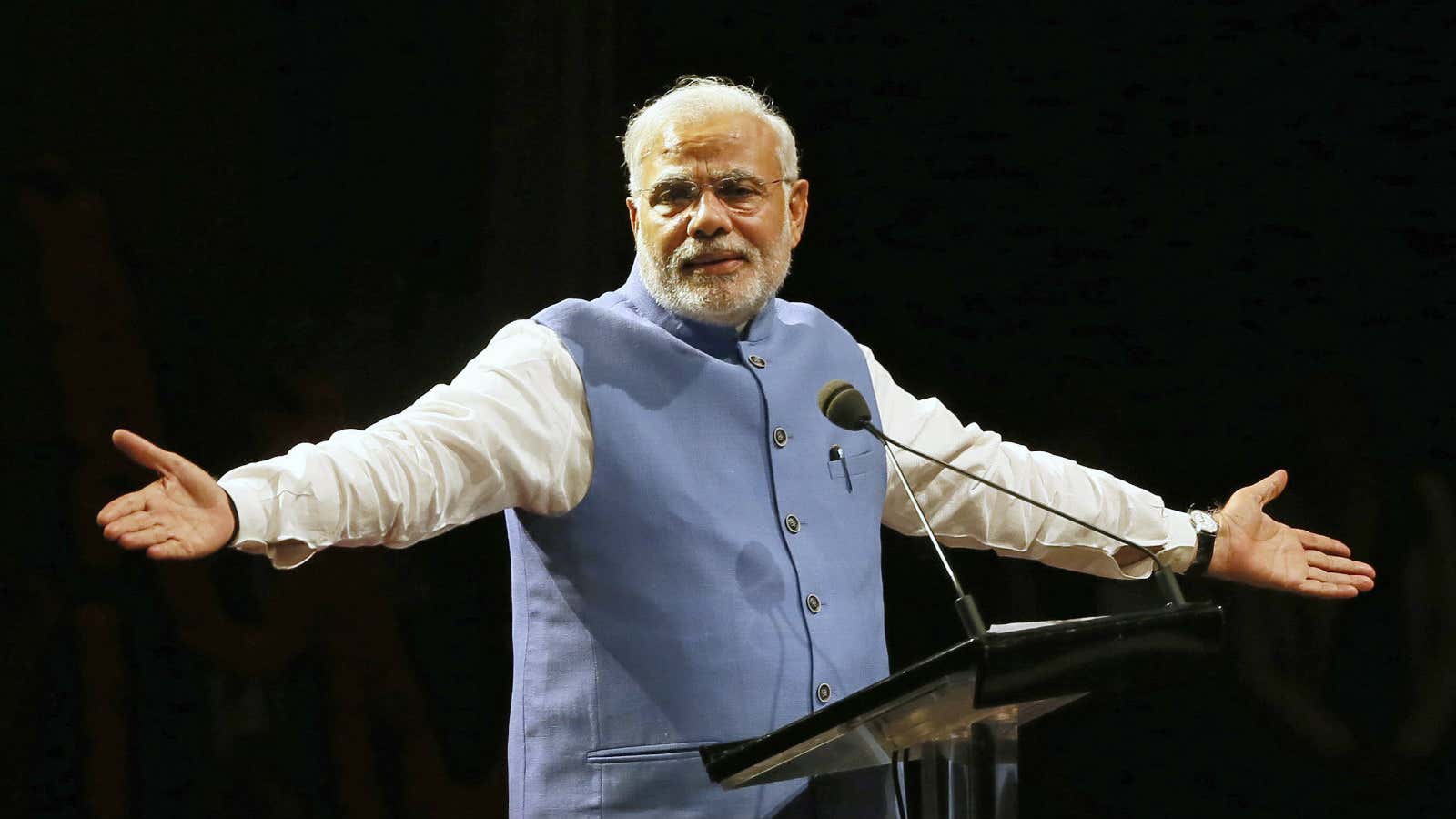An academic who strongly praised prime minister Narendra Modi’s widely criticised 2016 demonetisation move will soon be India’s next chief economic advisor (CEA).
On Dec. 07, the government announced that Krishnamurthy Subramanian, a professor at the Indian School of Business (ISB) Hyderabad, will fill the post. Ever since Arvind Subramanian quit as CEA in June this year, citing family commitments, the post has been lying vacant. The new CEA will serve a three-year term.
Among the key roles of India’s chief economic advisor are to determine the government’s overall strategy in managing the economy and help prepare the government’s annual economic survey, which provides a glimpse into its economic hits and misses.
Subramanian has joined the team of finance minister Arun Jaitley at a time when the Indian economy is faced with major challenges. These issues are all the more pressing given that the ruling government has to face a general election next year.
In October, the government said it has already breached the full-year fiscal deficit target of 3.3% of GDP. The fiscal deficit is the difference between a country’s revenue and expenditure and is a key indicator of its macroeconomic health. GDP growth also slowed during the July-September quarter, which spooked several rating agencies. They now expect India to grow at a slower rate than previously forecast.
An alumnus of the prestigious Indian Institute of Technology Kanpur and Indian Institute of Management Calcutta, Subramanian’s immediate task at hand will be to contribute in preparing the interim budget, scheduled for Feb. 01, 2019, before the next general elections.
Here are a few things you need to know about the new CEA who is expected to take charge soon:
A banking expert
Currently, Subramanian serves as an associate professor of finance and executive director at the Centre for Analytical Finance at ISB, India’s top business school. But his influence goes beyond academia.
Deemed to be an expert in banking and corporate finance, he has played a key role in drafting a few banking policies. For instance, he was a member of the Reserve Bank of India’s (RBI) PJ Nayak committee that was constituted to recommend policies on the governance of public sector banks (PSBs).
The move was prompted by the rising amount of non-performing assets (NPAs) in the accounts of PSBs. At the end of March 2018, the banking sector’s gross non-performing assets had risen to 11.6% of their combined loan book from 10.2% in September 2017. The government-owned banks account for a lion’s share of the toxic loans.
Then, in 2015, he also co-authored a paper with the deputy governor of the RBI, Viral Acharya, on the state of India’s PSBs.
Raghuram Rajan’s student
Subramanian earned an MBA and PhD in financial economics from the Chicago Booth School of Business, where he was mentored by former RBI governor Raghuram Rajan.
The former central bank chief has been associated with the Booth School since 1991 and was on leave during his tenure at the RBI. Rajan was known for his silver tongue and had also openly criticised some of the Modi government’s policies. This was deemed to be one of the main reasons why Rajan became the first RBI governor in 20 years to not have been offered a second three-year term.
Demonetisation backer
In November 2016, in a surprising move, the Indian government invalidated two high-value currency notes which accounted for 86% of the money in circulation. This sparked a massive cash shortage and also had a crippling effect on the economy.
However, several economists, among them Subramanian, supported this move. Soon after the note ban, in a newspaper article, Subramanian called it a refreshing change and believed it would be a revolutionary move against corruption. In another article, he had also stated that politicians highlighting the difficulties faced by the poor due to demonetisation were doing it for political gains.
“Our estimates suggest that the poor are likely to have visited a bank branch at most once to exchange their earnings in the old currency notes to new currency notes. Thus, we infer that the politicians advocating the difficulties faced by the poor are being disingenuous in pushing their claims for political gains.”
On various boards
Subramanian has served on the boards of Bandhan Bank and the National Institute of Bank Management, and has collaborated with the RBI.
He was also a member of a panel, led by the billionaire Indian banker Uday Kotak, that proposed governance reforms for listed companies in October 2017.
Subramanian is also a member of a number of other committees constituted by India’s markets regulator, the Securities and Exchange Board of India (SEBI).
